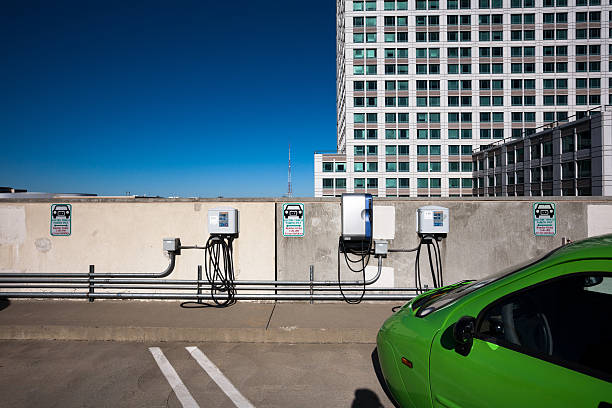- Level 2 charging refers to the installation of a 240-volt charging station that provides a faster and more convenient charging experience than the average household outlet, and this advanced charging option enables electric vehicle owners to fully charge their vehicles in less time.
- The benefits of Level 2 charging go beyond saving time, as more and more public Level 2 charging stations pop up everywhere, charging electric vehicles becomes more convenient and simple.
- Level 1 charging can take up to 20 hours to fully charge an EV, but Level 2 charging can achieve the same effect in as little as 4-8 hours, depending on the vehicle’s battery capacity, and this shorter charging time makes Level 2 charging more practical for daily use and long trips.
What is level 2 EV charging?
Level 2 charging refers to the installation of a 240-volt charging station that provides a faster and more convenient charging experience than a regular household outlet. This advanced charging option enables EV owners to fully charge their vehicles in less time, providing greater flexibility and reducing range anxiety.
Level 2 EV charging is much faster than Level 1 charging, which uses a standard 120-volt household outlet. While a Level 1 charge can take up to 20 hours to fully charge an EV, a Level 2 charge can achieve the same effect in as little as 4-8 hours, depending on the vehicle’s battery capacity. This shorter charging time makes Level 2 charging more practical for daily use and long trips.

Advantages of Level 2 charging
The benefits of level 2 charging go beyond saving time. With more and more public Level 2 charging stations popping up across the country, charging an electric vehicle on the go has never been easier. These charging stations are usually located in convenient locations such as shopping malls, parking lots and public places, allowing electric vehicle owners to charge their vehicles while running errands or going out.
In addition, level 2 charging can use energy more efficiently and help balance the load on the grid. By charging during off-peak hours, EV owners can take advantage of lower electricity bills and reduce strain on the grid during times of peak demand. This not only benefits individual EV owners, but also contributes to the overall stability and sustainability of the electrical system.
Furthermore, Level 2 charging is compatible with many electric vehicle models, making it a versatile and future-oriented option. Whether you own a Tesla or any other electric vehicle, a Level 2 charging station can meet your charging needs.
Level 2 EV charging infrastructure
The infrastructure for Level 2 EV charging is expanding rapidly, with both public and private entities investing in the installation of charging stations. This growth can be attributed to the increasing demand for EVs and the need to provide reliable and convenient charging options for EV owners.
Public Level 2 charging stations are typically located in high-traffic areas to maximise accessibility. They often include multiple charging ports, allowing multiple vehicles to charge simultaneously. Some charging stations even offer additional amenities such as Wi-Fi, restrooms, and food services to enhance the EV charging experience.
Private Level 2 charging stations are commonly found in residential areas, workplaces, and commercial settings. Many employers are installing charging stations in their parking lots to encourage employees to switch to electric vehicles and provide a convenient charging solution during working hours. Homeowners can also install Level 2 charging stations in their garages or driveways for convenient overnight charging.
How Level 2 EV charging works
Level 2 charging stations use a specialised charging cable, known as a J1772 connector, to deliver electricity to the vehicle’s battery. This connector is compatible with most EV models and provides a secure and reliable connection for charging.
When an EV is plugged into a Level 2 charging station, the station communicates with the vehicle to ensure a safe and efficient charging process. The station monitors the battery’s state of charge and adjusts the charging rate accordingly. This feature prevents overcharging and maximises the lifespan of the battery.
Level 2 charging stations also come equipped with built-in safety features such as ground fault protection and thermal sensors to detect any abnormalities during the charging process. These safety measures ensure that both the vehicle and the charging station are protected from any potential hazards.
Level 2 EV charging installation process
Installing a Level 2 charging station requires some electrical work and should be done by a qualified electrician. The installation process involves several steps, including:
Electrical assessment: The electrician will assess the electrical capacity of your property to ensure it can handle the additional load required for Level 2 charging. This may involve upgrading the electrical panel or wiring if necessary.
Permitting and approvals: Depending on your local regulations, you may need to obtain permits from the relevant authorities before installing a charging station. Your electrician can guide you through this process.
Charging station selection: Choose a Level 2 charging station that suits your needs and budget. Consider factors such as charging speed, connectivity options, and additional features.
Mounting and wiring: The charging station needs to be securely mounted on a wall or pedestal and connected to the electrical panel. Proper wiring and grounding are crucial for safe and efficient charging.
Testing and activation: Once the installation is complete, the electrician will test the charging station and ensure it is functioning correctly. They will also provide instructions on how to use the station effectively.
Also read: DFI unveils multi-function EV charging application
Level 2 EV charging costs and savings
The cost of installing a Level 2 charging station can vary depending on several factors, including the electrical upgrades required, the complexity of the installation, and the selected charging station brand. On average, the installation cost ranges from $500 to $2000, excluding any necessary electrical upgrades.
While the upfront cost of installation may seem significant, Level 2 charging can result in long-term savings. By taking advantage of off-peak electricity rates and charging at home overnight, EV owners can reduce their overall energy costs compared to relying solely on public charging stations or Level 1 charging.
Furthermore, Level 2 charging can help maximise the driving range of an EV. With a fully charged battery, EV owners can travel longer distances without worrying about running out of power. This increased range can save time and money by reducing the need for frequent charging stops during road trips.
Level 2 EV charging equipment and brands
When it comes to Level 2 charging equipment, there are several reputable brands to choose from. Some popular options include:
ChargePoint: ChargePoint offers a wide range of Level 2 charging stations for both residential and commercial use. Their stations are known for their reliability, smart features, and user-friendly interface.
Siemens: Siemens provides high-quality Level 2 charging solutions for various applications. Their charging stations are built to withstand harsh weather conditions and offer advanced safety features.
JuiceBox: JuiceBox is a leading brand in the Level 2 charging market, offering affordable and efficient charging stations. Their stations are compact, portable, and compatible with a range of EVs.
It is crucial to select a charging station that meets your specific needs and budget. Consider factors such as charging speed, connectivity options, durability, and warranty when choosing the right equipment for your EV.

